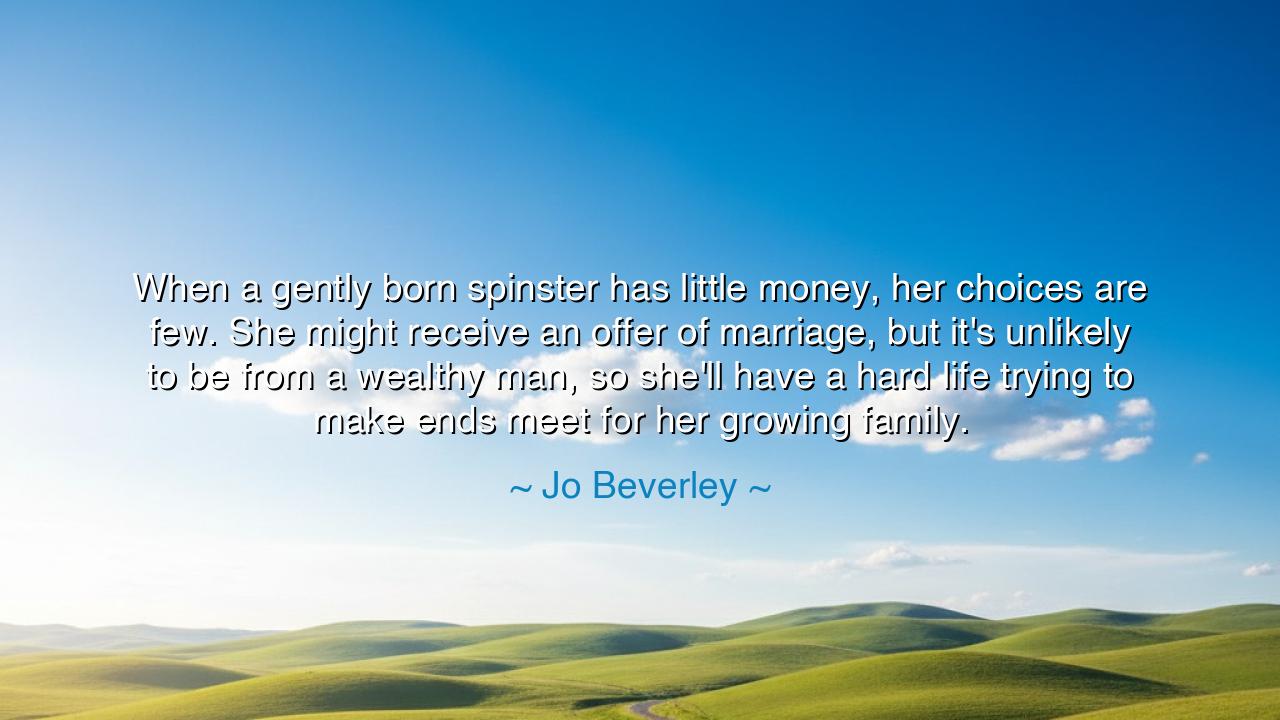
When a gently born spinster has little money, her choices are
When a gently born spinster has little money, her choices are few. She might receive an offer of marriage, but it's unlikely to be from a wealthy man, so she'll have a hard life trying to make ends meet for her growing family.






When Jo Beverley observed, “When a gently born spinster has little money, her choices are few. She might receive an offer of marriage, but it’s unlikely to be from a wealthy man, so she’ll have a hard life trying to make ends meet for her growing family,” she spoke with the voice of one who knew the weight of history and the hardships of women in a world governed by rank and fortune. Her words, though simple, unmask the cruel truth of past societies: that birth and wealth often dictated the destiny of women more than love, talent, or spirit.
The meaning of this quote lies in the chains of circumstance. A spinster, a woman unmarried beyond the expected bloom of youth, carried with her the stigma of failure in eras where marriage was not merely companionship but survival. If she was “gently born”—raised in refinement but without fortune—her situation was doubly precarious. For she was too refined for labor, yet too poor for independence. Her prospects narrowed to a handful of choices: the charity of relatives, the drudgery of governess work, or the hope of marriage—often not to a man of means, but one struggling himself, ensuring hardship for the entire household.
The origin of such realities comes from centuries of European social order, particularly in the Regency and Victorian eras, when women’s fortunes were bound to dowries and inheritance. In England, primogeniture—the passing of estates to the eldest son—left daughters dependent upon the generosity of fathers or brothers. Without wealth, their beauty and youth were their bargaining coins in the marriage market. Beverley, a novelist of historical romance, drew upon this harsh backdrop to frame the dramas of her heroines, weaving fiction out of very real historical constraints.
History offers a vivid example in the life of Jane Austen’s own family. Austen herself, unmarried and with little money, understood this plight. In her novel Pride and Prejudice, Charlotte Lucas accepts marriage to Mr. Collins not out of affection, but out of necessity. At twenty-seven, she knew her chances of another offer were slim, and without a husband, she faced the dreary fate of dependence. Austen’s characters and her own life mirrored the reality Beverley described: that for many women, marriage was less about love than about survival.
The wisdom of Beverley’s words lies in their unflinching honesty. They remind us that what is often romanticized—the proposals, the unions, the grand weddings—was in truth bound up with economics and social survival. For the poor spinster, marriage was not the promise of bliss, but the gamble of endurance. Love, if it came, was a blessing; more often, the union brought toil, struggle, and the daily battle to feed and clothe a growing family. The glitter of wealth belonged to a few; for most, life was a stern teacher.
The lesson here is twofold. First, we must honor the resilience of those women who endured these narrow choices, carving dignity from scarcity and strength from limitation. They remind us that hardship does not diminish worth, but rather refines it. Second, we must see how far society has come—and how far it must still go—in granting women the power of independence. Today, though opportunities are broader, the echoes of that old struggle remain, and justice demands we continue to ensure that no life is crushed beneath the accident of birth or the absence of wealth.
What then must the listener do? In your own life, treasure the freedoms you possess—education, work, and the right to choose your own path. Guard them fiercely, and extend them where they are denied. Remember the lessons of the past: that for countless women, survival was bound to marriage not by love, but by necessity. Let your ambition be to build a world where no one’s worth is measured by wealth or birth, but by their spirit, their gifts, and their humanity.
Remember always: the choices of a gently born spinster reveal the inequalities of her age. Jo Beverley’s words are not just a reflection of history, but a call to cherish and expand the freedom that past generations longed for. Pass this wisdom to those who come after: that equality is the truest wealth, and freedom the fairest inheritance.






AAdministratorAdministrator
Welcome, honored guests. Please leave a comment, we will respond soon